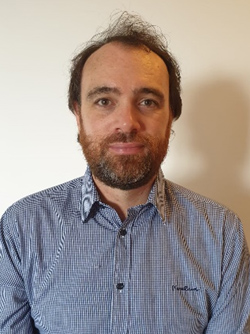
Associate Prof. Timothy Hunter
School of Chemical & Process Engineering
University of Leeds, UK
E-mail: t.n.hunter@leeds.ac.uk
Dr. Hunter is an Associate Professor in Chemical and Nuclear Engineering, and is head of the Nuclear Engineering Group within the School of Chemical & Process Engineering (https://eps.leeds.ac.uk/chemical-engineering-sustainable-systems-processes/doc/nuclear-engineering). He has >80 publications in the areas of applied colloid and particle science, as well as multiphase suspension and slurry processing, while he has also been an investigator on +?3m in funding from UKRI, EU H2020 and industry. His main current motivation in multiphase flows is in advanced in situ characterisation methods to safely monitor the transfer and separation of radioactive wastes, and also the development novel, intensified effluent treatment processes. Of particular relevance to the IMFTF, he is currently an investigator on the UK's EPSRC funded TRANSCEND Consortium (https://transcendconsortium.org/) on the design of novel online acoustic backscatter systems for remote slurry monitoring, while he is also an investigator on UK-Korea funded work into electrokinetic separation for enhanced decontamination. He was also work package lead for the EU H2020 funded ProPAT project (http://pro-pat.eu/) on the development of advanced measurement and control systems for industrial multiphase process systems in the high value chemicals and minerals sectors.
Title: The use of ultrasonics for online characterisation of multiphase suspension flows and separation: Applications in nuclear waste processing.
Abstract: Within the UK nuclear environment, there is a considerable accumulation of legacy wastes in the form of liquid effluents and suspensions or sludges, contained in various ponds, silos and tank storage areas. For many waste operations, there are significant challenges to safe and efficient waste processing, due to their complex compositions, poor current containment facilities and, most importantly, a lack of available characterisation data. In response to these problems, our research group have investigated the application of ultrasonics, as innovate online characterisation instrumentation. Presented in this talk will be a number of ongoing case studies, where novel backscatter profilers have been used to monitor nuclear waste transport in multiphase pipeflows, as well as larger waste separators and intensified agitated tubular reactors. Comparisons with predictions from computational fluid dynamics are also included, as ultimately, the UK nuclear industry seeks to use digital twins as a hazard free route to process understanding and optimisation.